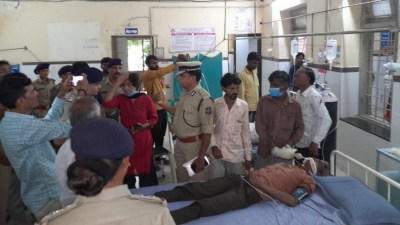Educationist backs Prohibition, says Gandhiji was against liquor revenue going into schools
By IANS | Published: July 30, 2022 01:06 PM2022-07-30T13:06:06+5:302022-07-30T13:20:08+5:30
Ahmedabad, July 30 The terrible liquor tragedy which snuffed out 46 precious lives in the dry land of ...

Educationist backs Prohibition, says Gandhiji was against liquor revenue going into schools
Ahmedabad, July 30 The terrible liquor tragedy which snuffed out 46 precious lives in the dry land of Bapu, where liquor ban has been in force since 1960, has rekindled a debate on prohibition.
In the light of this and many such incidents, a factor that has emerged strongly is the "flawed" implementation of the policy which has resulted in burgeoning illegal liquor business. For the mighty politic and police responsible for prevention for crime, it is nothing but an Any Time Money machine.
Educationists and social activists advocate for continued paralysed prohibition policy, saying that though mired in corruption, it still helps in peaceful and prosperous Gujarat.
For Mahatma Gandhi liquor consumption was not only a socio-economic matter, but he also believed in ethics, said Sukhdev Patel, an educationist.
Citing an example of 1939 he said: "During the provincial government, Mumbai state was in favour of imparting free primary education, but the British were against taking the financial responsibility. They suggested levying tax on liquor to fund the free primary education. Gandhiji opposed the idea vehemently saying education should never be imparted with liquor money."
Bapu then came up with "Nai Talim" (vocational schools) concept, under which students would not only be educated but trained in various art skills. The products they produce were consumed/purchased by society. This, not only produced skilled manpower making school self-reliant, but also reduced the burden on the state, says Patel.
Despite loopholes, the policy still provides some security to the women of the state. Domestic violence does take place and men do steal the hard-earned money of their wives but it's happening on a limited scale. If the prohibition is lifted, there will be anarchy in the society making the the fairer sex more vulnerable to male artocities, opines social activist Ruzan Khambhata.
On the failure of the implementation of prohibition, he quotes High Court's observation in a public interest litigation, "Police should stop filing designed FIR in prohibition cases as because of it the accused are absconding in large numbers."
According to her, the police and politic are not interested in implementing the policy as it is the parallel economy which fills their personal coffers.
If a massive movement demanding lifting of prohibition is launched, the police force will oppose it discreetly and ensure its derailment. As the flawed implementation happens to be their "milch" cow, who in their senses would want to kill it?
Disclaimer: This post has been auto-published from an agency feed without any modifications to the text and has not been reviewed by an editor
Open in app